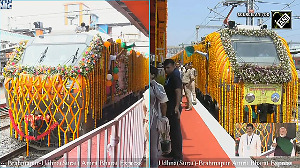Addressing a media conference in the committee hall in Assembly premises, the Chief Minister strongly refuted the charge by Telangana Rashtriya Samiti chief K Chandrasekhar Rao that the Congress had deceived the TRS on this issue. "There is no question of deceiving anyone. Our party is not in the habit of deceiving anyone inside or outside," he declared.
"Our stand is very clear. We are for the constitution of second States Reorganisation Commission to go into this issue. I am neither for nor against separate Telangana state. I am all for respecting the sentiment of Telangana people," he clarified.
He also pointed out that the Congress leaders from the region first raised the Telangana issue after the 1994 elections. When the previous Telugu Desam Party government was neglecting the region's development, the Congress leaders raised their voice against this.
After the 1999 Assembly polls, the Congress legislators from Telangana met Congress president Sonia Gandhi and represented to her about the neglect of this region.
They also expressed the apprehension that the development of Telangana would not be possible in an integrated Andhra Pradesh under TDP rule. Hence, they wanted the Congress high command to mount pressure on the then National Democratic Alliance government to look into this issue.
Based on the request of the Congress MLAs and leaders from Telangana, the Congress Working Committee in 2001 discussed the issue and adopted a resolution for constituting the Second SRC to look into this issue. The resolution was sent to the then NDA government. The then Union Home Minister L K Advani sent a reply to Sonia Gandhi stating that there was no need for second SRC.
Advani had also mentioned that similar demands for smaller states were raised in various other states. Smaller states were neither viable nor conducive to the integrity of the country.
In the meantime, the TRS was formed in the state with the agenda of separate Telangana state. Before the 2004 Assembly elections, the Congress and TRS came to a pre-poll understanding. TRS boss K Chandrasekhar Rao talked to senior Congress leader Pranab Mukherjee. The Congress high command clearly told KCR that the Congress was for second SRC.
After TRS and Congress reached an agreement for poll alliance, a joint statement was issued on March 4, 2005 and widely reported in the newspapers on March 5.
The Congress party's manifesto for Andhra Pradesh also mentioned the party's stand in favour of second SRC. The joint statement and the manifesto clearly noted that there were many valid reasons for formation of separate states in Telangana and Vidarbha.
However, the reorganisation of existing states raised a large number of issues. Hence, the Congress party felt that the whole matter could be best addressed by another SRC to look into all the issues involved.
"It is pretty clear that there is no question of deceiving anyone before or after the polls," Dr Reddy said and pointed out that the separate Telangana issue was also included in the United Progressive Alliance's Common Minimum programme to pursue the same on the basis of consensus. Both the TRS and state Congress left the issue to be sorted out by Sonia Gandhi.
Rejecting KCR's allegation that Sonia Gandhi did nothing on this issue in the last two years, the chief minister felt that the Congress president would require some more time, may be another one and a half years, to decide on the issue whether a separate state would benefit the people of Telangana or whether this could be ensured in an integrated Andhra Pradesh. "I don't know what is in her mind. It will take time," he added.
Dr Reddy said that the Telangana sentiment was still there among the Congress members and leaders from the region. But Sonia Gandhi's decision would be binding on everyone. "We are committed to abide by whatever decision she takes on the issue," he explained.
To a question why should Delhi decide a key issue pertaining to the state, he said "our party high command in Delhi will look into all the aspects and angles of the issue. They won't take any anti-people decision. This process may take one or one and a half years.
Asked if he was setting a deadline of one and a half years for the issue to be sorted out, he quipped, "I am not in the habit of setting deadlines."





